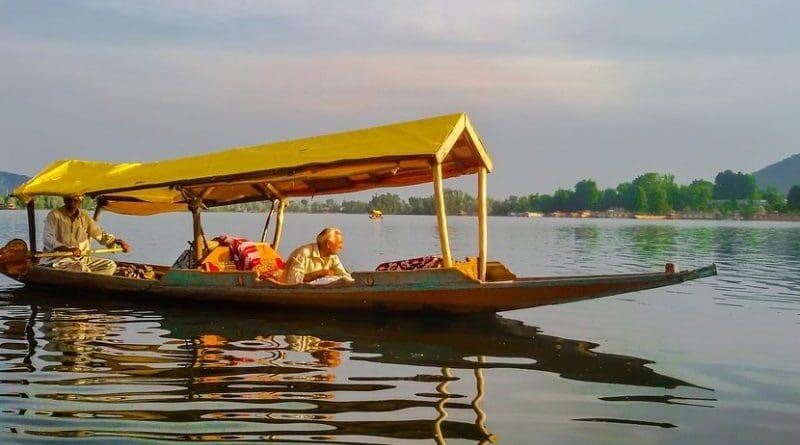J&K: Political Stability And The 2019 Lok Sabha Elections – Analysis
By IPCS
By Sarral Sharma*
Two years since Hizbul Mujahideen (HM) Commander Burhan Wani’s encounter killing in Jammu & Kashmir (J&K), the Bharatiya Janata Party (BJP)-led Centre in New Delhi continues to face multiple political challenges in the state. More importantly, there continues to be a perception gap between New Delhi and Srinagar on how to handle outstanding domestic political and security issues in J&K. Prevailing circumstances indicate that New Delhi is likely to face an uphill task as it tries to improve the political situation in the Kashmir Valley in the run-up to the 2019 Lok Sabha elections.
Conducting the long overdue elections for the Panchayat, urban local bodies, State Assembly and the 2019 Lok Sabha polls in J&K will be the top priority for the central government. Other priority issues towards fostering a conducive election environment include: improving intra-state relations between Jammu, Kashmir and Ladakh; initiating dialogue with stakeholders; and restoring confidence among those who appear to have lost faith in the country’s democratic institutions.
Political Situation in J&K
The BJP is already in election mode in preparation for key state elections that are scheduled to take place over the next few months, followed by Lok Sabha polls in 2019. As a result, New Delhi may prioritise issues relevant at the national level over addressing state-level political issues in J&K. Growing local militancy and related developments in the character of the militancy are likely to exacerbate the prevailing security situation in the Valley, and will collectively continue to hinder New Delhi’s efforts to improve the situation in Kashmir.
Incidentally, the recent breakup of the BJP-People’s Democratic Party (PDP) coalition government in J&K, followed by Governor’s Rule, did provide some local relief in Kashmir. PDP supporters, mostly from the militancy affected South Kashmir region, felt betrayed after the party entered an alliance with the BJP in 2015. In fact, even the PDP was uncomfortable with BJP’s ‘muscular’ Kashmir policy, among other political differences, as regular killings of local militants and civilians impacted the party’s influence in the Valley. Therefore, the breakup of the BJP-PDP alliance can be viewed as a failure to manage differing perceptions in New Delhi and Srinagar on issues related to domestic politics and security in Kashmir.
The J&K legislative assembly stands suspended since the BJP-PDP breakup in June 2018. It is unclear yet as to whether the central government will call for ‘fresh’ elections in the state or attempt to form a new alliance with dissident members of the PDP, National Conference (NC) and some independent legislators. For now, it seems unlikely that the BJP would take the unnecessary risk of forming a new coalition before the 2019 parliamentary elections, as that might not last long and could lead to more chaos in the state.
Similarly, the main opposition parties–PDP, NC and Congress–will not form an alliance due to apparent political and ideological differences. Interestingly, there is a growing demand for a new political alternative–a new political party or a new coalition–in Kashmir, outside the traditional options: PDP, NC or Congress. It is possible that New Delhi might not rush to look for that alternative in the prevailing unstable environment in the Valley, albeit such an option cannot be ruled out in the near future. For now, Governor’s Rule will likely continue given how the odds of government formation in J&K are limited.
In that case, the governor’s role becomes crucial to address issues related to local politics and governance in the state while regularly monitoring the security situation in the Valley. The new governor, Satya Pal Malik, faces the difficult task of simultaneously resolving the governance deficit in the state; accelerating development activities; engaging with local mainstream political parties; and continuing strong counter-terror measures in J&K. However, his main task is to initiate political activity in the state. Holding successful Panchayat and urban local bodies’ elections will be a step in the right direction. More importantly, these elections will pave the way for the J&K State Assembly and the 2019 Lok Sabha polls.
Looking Ahead
Conducting these elections will pose a massive security challenge for the local administration. Although security agencies have claimed that they possess the capacity to provide sufficient security during the elections, the threat of possible militant attacks on political workers and J&K state administration officials looms large. In the present security environment in the Valley, it will be crucial for the governor and his administration to convince the people to participate in the elections.
Any delay in these elections would create more problems for the central government. For instance, intra-regional differences between Jammu, Kashmir and Ladakh have increased since the 2016 Wani encounter. Regular shutdowns in the Kashmir Valley in the past two years also impacted everyday governance in other regions of the state. Therefore, these elections are pivotal to address grassroot governance issues, and any delay will only fuel more anger and may lead to further intra-state differences.
The bigger challenge for New Delhi is in addressing the perception gap between Jammu, Kashmir and Ladakh. Only after resolving intra-state differences can the BJP-led Centre bridge the gap between New Delhi and Srinagar. For that to happen, the Centre will require to conduct regular dialogue with internal stakeholders such as educationists, civil society representatives, local businessmen, separatists and state political leaders from all three regions.
New Delhi would not want to witness a repeat of the 2017 Srinagar parliamentary by-poll which was marred by violence and witnessed a meagre seven per cent voter turnout. The situation on the ground has not changed much since 2017. To conduct the forthcoming polls and to form a stable democratically-elected government in J&K, New Delhi will need to bridge the above mentioned perception gaps in the coming months.
*Sarral Sharma
Researcher, Centre for Internal and Regional Security (IReS)

